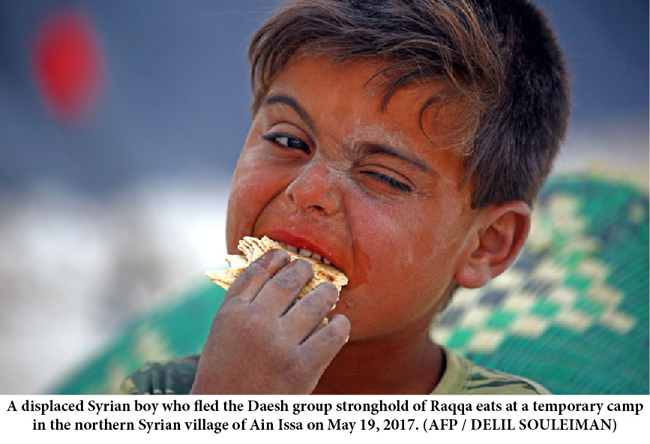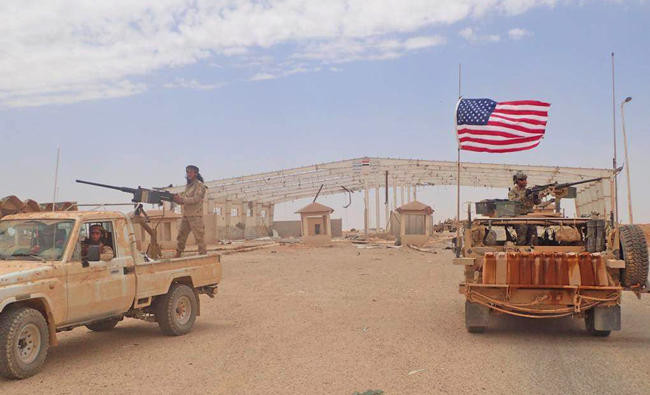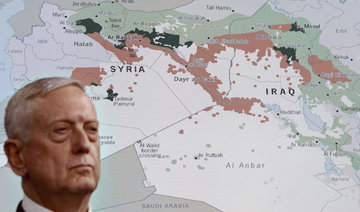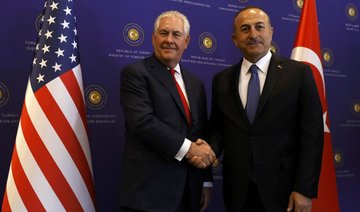WASHINGTON: The six-year cold peace that the US and Iran have operationally maintained in Syria could be approaching an end as their rival strategies collide in the east and south of Syria.
This silent truce between US and Iran effectively broke on May 18 when the US-led coalition carried out its first airstrike against an Iranian proxy group near the base of Al-Tanf, close to Syria’s border with Iraq and Jordan.
The base hosts US advisers and local forces that Washington is training in its battle to take back Daesh-held territory. But the strike, experts agreed, is a harbinger of a period of more confrontation between US and Iran as their agendas seem bound to clash in a post-Daesh Syria.
Fight for geopolitics and territory
In a briefing from the US Defense Department on Wednesday, Air Force Lt. Gen. Jeffrey Harrigian defined the May 18 strike as a move to protect pro-US forces. “First thing I would say is I’m concerned about any threat to our forces on the ground,” he said.
Harrigian did not apologize or shy away from further action against Iranian proxies if they become a threat to the US-trained forces. “I’m just going to reiterate the fact that we will protect our forces... we will do what it takes to ensure that our ground forces, if they’re threatened, we’re going to take the necessary action,” he said.
The operational dynamics on the ground in Syria are inching Tehran and Washington closer to a confrontation said Nicholas A. Heras, a fellow at the Center for a New American Security (CNAS) in Washington.
“The IRGC (Iranian Revolutionary Guard Corps) is running Iranian foreign policy toward Syria, and the IRGC is acutely aware that building US military presence in southern and eastern Syria would take significant territory out of Assad’s reach,” Heras told Arab News.
In essence “Iran does not want Assad to be left with nothing to claim on the monopoly board that is Eastern Syria,” which explains the recent buildup of pro-Iran militias in the area according to the expert.
Faysal Itani, a senior fellow with the Atlantic Council’s Rafik Hariri Center for the Middle East, told Arab News the US strike was “simply a move by Washington to enforce basic principles that it will protect its forces and local allies, including in areas where there are ongoing offensive operations.”
In the bigger scheme, the fight is one for leverage and territory, explained Heras. “The Trump administration is actively looking for options to utilize the counter-Daesh campaign, and the territory conquered by US-backed (forces), to prevent Iran from achieving its objectives in Syria.” Heras added that “the US wants to build maximum leverage on Bashar Assad and his friends Iran and Russia, and the best way to do that now is by capturing and ruling territory in eastern Syria.”
Ripe for escalation?
Itani defined the US and Iran as “adversaries in a zero-sum geopolitical competition,” but with limitations in Syria. In this latest development Itani said “the US has an anti-Daesh mission, and fighting it appropriately means taking steps that infringe on Iranian territorial and political interests in Syria.”
Another clash of interest is in Iran’s fear “that the US will support a large Saudi and GCC (Gulf Cooperation Council) stabilization mission in eastern Syria,” said Heras. The expert added that “Iran sees the US counter-Daesh campaign as a tool for the Arab Gulf countries to enter Syria in lockstep with the United States.”
Both Heras and Itani agreed that Iran will continue to try to test US limits and its growing zone of influence in eastern Syria. “Escalation is ripe, and the US would most likely win that encounter,” said Heras. Itani cautioned that despite Washington’s military superiority “Iran can complicate things tremendously in Syria and elsewhere.”


























